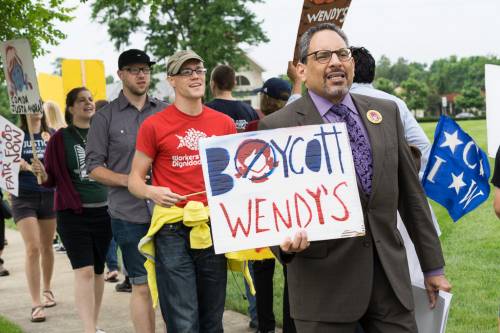California church embraces organic gardening and protecting the environment
Congregation mobilized to reduce its carbon footprint
May 20, 2016

Youth from the Sleepy Hollow Presbyterian Church prepare gardens for planting. —Ethan Russell
Presbyterian News Service
Rick Jones
LOUISVILLE
The rolling hills and beautiful valleys of Marin County, California provide the perfect backdrop for
Sleepy Hollow Presbyterian Church. One look at this majestic landscape and it doesn’t take much to inspire people to protect and nurture it.
With growing concern about the environment, drought and children living in poverty, the Sleepy Hollow congregation was motivated to form an environmental “Green Team” in 2014 and they didn’t have to go very far to determine where to start.
“We have this huge backyard that God has given us and we’ve got gardeners and a commitment to feeding the hungry, so where do we go with all of this?” asked the Rev. Beverly Brewster, pastor. “We have a lot of garden people in our congregation and they looked at this sunny backyard and had a vision.”
Working and collaborating with a
Presbyterian Hunger Program grant partner, the
Interfaith Sustainable Food Collaborative, church members developed a work plan to develop an organic “justice” garden. [Garden was also partially funded by Cents-Ability grants from the Redwoods Presbytery, Hunger Task Force.]
“This is a well-to-do suburban neighborhood. People have big yards and a lot of them have their own gardens,” said Brewster. “We decided that a community garden wasn’t the need here. The need was to grow food for people who do not get good organic, fresh vegetables.”
After two successful growing seasons, Brewster says God has blessed their garden with huge tomatoes.
“It’s been interesting because many of the neighbors have grown tomatoes but are amazed at how large ours have been,” she said. “We have been so blessed and have actually grown 1,000 pounds of organic tomatoes the past two seasons.”
The vegetables grown in the garden are given to low income senior citizens and children connected with the food bank or are sold at a church farm stand. The money raised then goes back into the garden.
Sleepy Hollow has developed a relationship with a nearby school that serves under-privileged children who are more than happy to receive the garden’s bounty.
“Approximately 93 percent of these children live well below the poverty line,” said Brewster. “When we take our vegetables to the school, the children pick up the tomatoes and eat them like candy. It is such a treat for them and it is amazing to see how their faces brighten up.”
But Sleepy Hollow is about more than growing organic vegetables. The church is involved with water conservation, securing a grant to put in a rainwater catchment tank to support the gardening efforts. The congregation is also in the process of raising funds for solar panels.
“We want to reduce our carbon footprint and be a green church,” said Brewster. “We also hope to eventually put in an electric car charging station.”
“Right relationships with God, others and the earth—we all want it, we crave it, but sometimes we don’t know where to start,” said Ruth Farrell, coordinator of the Presbyterian Hunger Program. “Sleepy Hollow Presbyterian’s story of their mission in their context is encouragement to congregations everywhere. I love that this congregation channels God’s gifts of rain, sun and dirt into something that benefits others, and in so doing, knows the blessing of caring for God’s creation and fellow creatures. Connecting to kids who lack access to healthy food builds friendships with kids and schools which leads to fighting hunger and poverty with all of our tools—meeting needs, advocacy for healthy school lunches as well as programs to help parents provide for their kids, and reducing our own carbon footprint that helps us live in ‘right’ relationships which will end hunger and poverty and lead to all kinds of abundance.”
Brewster says the combined projects and planning have energized the church.
“This has been fantastic. The people love seeing something come out of nothing and it has been an inspiration to be a part of it,” she said. “People are so joyful. It has been revitalizing for the church.”
For more information about how your church can get involved in food justice or environmental issues, visit the
Presbyterian Hunger Program web page.


